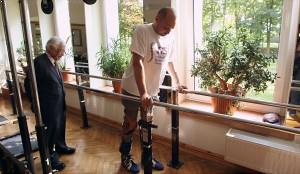Since watching the To Walk Again Panorama special last week, many have asked for my opinion. Rather than repeat myself I thought I’d take a few days to put forward a considered verdict rather than an immediate knee-jerk reaction. *insert your own spasm related pun*
“Curing paralysis”, “cord regeneration” and “just around the corner in 10 years or so” are phrases that have been around since I was in hospital, almost certainly long before then too. Whilst I’ve always maintained I won’t remain confined to this god-forsaken contraption for the rest of my life, I’ve always been realistic enough to know such a miracle cure (once announced) would still take considerable time to develop to a point of mass use.
Spinal Cord Injury, like any disability, is unique to every individual as we’re all wired differently, so one treatment for one person maketh not a successful blueprint. It’s contingent on a number of other factors: age of injury, age and physical condition of the individual, ongoing pre and post treatment physiotherapy and ultimately whether damaged nerves start to send signals through again after reconnection. That cells come from the same individual is fascinating and may cater for our individuality, certainly sits more comfortably with my morales than using unborn fetuses.
 Ask anyone in my position whether they’d want to walk again, they’d of course say “yes”. Ask them about such a “cure” as recently announced, I’ll bet in most cases you’d get a more guarded response. The spinal cord regrowth shown in the programme was the most fascinating part for me. I agree most SCI sufferers would actually take such a treatment if it helps improve more practical (less media headline grabbing) bodily functions as noted by Darek that most take for granted: bladder, bowel, temperature regulation and sexual function, though I must confess the latter has continued to operate as independently from my brain as it ever did beforehand.
Ask anyone in my position whether they’d want to walk again, they’d of course say “yes”. Ask them about such a “cure” as recently announced, I’ll bet in most cases you’d get a more guarded response. The spinal cord regrowth shown in the programme was the most fascinating part for me. I agree most SCI sufferers would actually take such a treatment if it helps improve more practical (less media headline grabbing) bodily functions as noted by Darek that most take for granted: bladder, bowel, temperature regulation and sexual function, though I must confess the latter has continued to operate as independently from my brain as it ever did beforehand.
That Darek noted improvements after a complete spinal cord injury is most impressive, particular for someone like myself with an incomplete lesion where I have and continue to regain movement and feeling 16 years later. Temperature control would be massive for me, I find it ridiculous how my body reacts differently to everyone else’s with slight changes simply because I can’t sweat. If regrowth could negate Autonomic Dysreflexia potential, it would lift a very dark cloud that I constantly have to be vigilant for. Regaining enough arm movement for every day tasks rather than calling on a PA every 2 minutes or even to live independently would more than satisfy me.
It was delightful to see a positive news piece being widely reported and generally received so warmly for a change. The programme could have focused more on the hard science of the research, it only really got going in the second half. I appreciate the Beeb had to cater for an audience knowing little or nothing about spinal cord injury, but I don’t believe many would care about a 5 minute conversation with Heston Blumenthal and his opinion on world affairs. I don’t doubt his noble intentions as a trustee of the Nicholls Spinal Injury Foundation, which continue to raise significant funds for such research, but I fail to see why this was necessary for the amount of time it took (unless he’s using spinal fluid in one of his latest culinary concoctions – jest maybe, but certainly wouldn’t put it past him!)
What impressed me is the research sees the convergence of several projects over the years, so we can track the progression of stellar work done by the likes of Professor Geoffrey Raisman. If this indeed leads to a finite cure, the man deserves a Nobel prize for every injury successfully repaired, never mind just the one!
It’s wrong such projects don’t receive anywhere near as much funding as it should. I will never belittle any cancer sufferers (it’s the most remorseless mother of all bitches) but if you purely look at the numbers involved – 3 million SCIs vs many millions more cancer sufferers worldwide, you can see why pharmaceutical companies have a vested interest in making terminal conditions chronic rather than a “one off cure”, much though no one would morally agree with it.
If you equate curing paralysis to the length of a marathon, this research is the equivalent of getting your toe just over the start line. There’s a long way to go, but this at the very least is a step in the right direction.
Sign me up Geoffrey, I’m in.
Rm.

